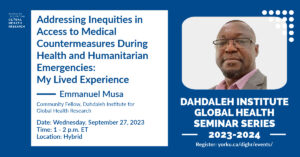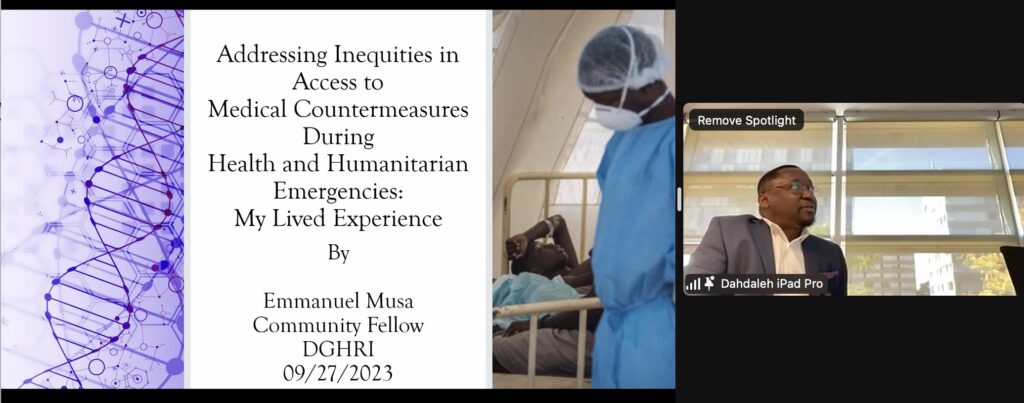Post
Published on October 19, 2023

On September 27, 2023, Dahdaleh community fellow Emmanuel Musa illustrated the consequences when countries do not have access to medical countermeasures (MCMs) – strategies and tools that can be implemented during a wide range of emergencies. Examples of MCMs include vaccination programs, medicine and medical, diagnostic tools, personal protective equipment, enacting public health measures, and decontamination techniques.
During his time as an epidemiologist team lead in Beira, Mozambique, Dr. Musa witnessed the disastrous effects of the 2019 Tropical Cyclone Idai. The cyclone resulted in over 100,000 homes destroyed leaving hundreds of thousands displaced and even more without food, electricity, and access to clean water. According to the UN, it caused an estimated $773 million in buildings, crops, and infrastructure damages. In just two weeks, cholera and diarrhoeal diseases began to spread. Under these circumstances several MCMs were deployed, temporary shelters, medical teams, mental health and psychosocial support, logistics support, an emergency operations centre was established to coordinate resources, expertise, and equipment.
Despite these efforts, not all areas and all citizens were able to access all the resources. Women, children, and the elderly felt overlooked by responding teams. Dr. Musa stated that inequities had to be addressed though integrated approaches that targeted more vulnerable areas. Organizations collaborated with the local governments, NGOs, civil society, and other influential persons to find solutions and spread word about plans to reach everyone. Dr. Musa emphasized the importance of a MCMs communication phased approach and to involve policymakers as much as possible.
Lastly, he shared the key principles of humanitarianism (humanity and impartiality) and the need to build local capacity to improve emergency preparedness. Dr. Musa advocated for the importance of global advocacy and solidarity with a multi-prong approach to equitable access to MCMs. This would require more investment towards affordable MCMs and resource allocation that prioritizes underserved, at-risk areas.
Watch the seminar presentation below:
Connect with Emmanuel Musa
Themes | Global Health & Humanitarianism |
Status | Active |
Related Work |
N/A
|
Updates |
N/A
|
People |
You may also be interested in...
Dahdaleh Graduate Scholar Advocates for the Protection of All Civilians Against Violence in Israel and Gaza
Dahdaleh graduate scholar Sarah Khan recently published an article in the Policy Options where she discusses Canada's response to the Israel-Hamas conflict. The government initially condemned the terror attack on Israel and later called for a ...Read more about this Post
York University Presents 15 York Research Chairs
Fifteen York University researchers have been named new York Research Chairs (YRC), an internal program that mirrors the national Canada Research Chairs (CRC) program which recognizes world-leading researchers in a variety of fields. “The York ...Read more about this Post
Recap — Chlorine, Contamination and Governance: Examining Water Quality Challenges in Lusaka, Zambia, with Hillary Birch
On February 26, 2025, Dahdaleh Graduate Student Scholar, Hillary Birch, explored the urban governance of water quality in Lusaka, Zambia. A PhD candidate in Environmental Studies at York University, Birch presented findings from her six-month ...Read more about this Post



